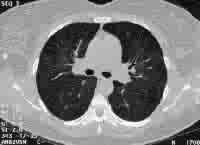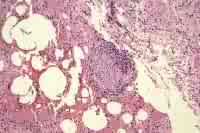While
Beryllium is considered safe in its solid form, its dust or fumes can
cause illness. These forms primarily affect the lungs, but can also cause
dermal issues if it enters the body via an opening in the skin. The inhalation
of beryllium dust or fumes can result in a couple different beryllium-related
illnesses: beryllium sensitization and chronic
beryllium disease.
Beryllium sensitization is similar to an allergic
reaction: after an individual inhales beryllium dust or fumes, the immune
system may see the element as a foreign invader. Cells accumulate in the
bloodstream, prepared to mount an attack against any beryllium particles
encountered. Beryllium sensitization is a condition which presents no
symptoms. Beryllium sensitization can be discovered in an individual via
a blood test called the beryllium lymphocyte proliferation test, or BeLPT.
The BeLPT test is highly specific; once beryllium is introduced to the
blood sample, if the blood reacts, then only beryllium is responsible
for the reaction. A normal BeLPT test indicates no immune response to
beryllium, ruling out beryllium sensitization as well as chronic beryllium
disease.
Chronic beryllium disease is a scarring of the
lungs that result from the immune system attacking foreign beryllium particles.
Disease symptoms can take years to develop. Commonly noted symptoms of
CBD include shortness of breath during activity, persistent dry cough,
fatigue, chest and joint pain, and increasing loss of appetite. To diagnose
CBD, the BeLPT is insufficient on its own; this test only shows an immune
reaction to beryllium. If an individual has abnormal BeLPT results, further
medical evaluation is recommended. Further testing often includes chest
x-ray, pulmonary function testing, blood work, exercise tolerance testing,
and bronchoscopy with a possible biopsy. While most workers exposed to
beryllium do not develop beryllium sensitization or CBD, exposure to beryllium
should be limited or eliminated.
|


